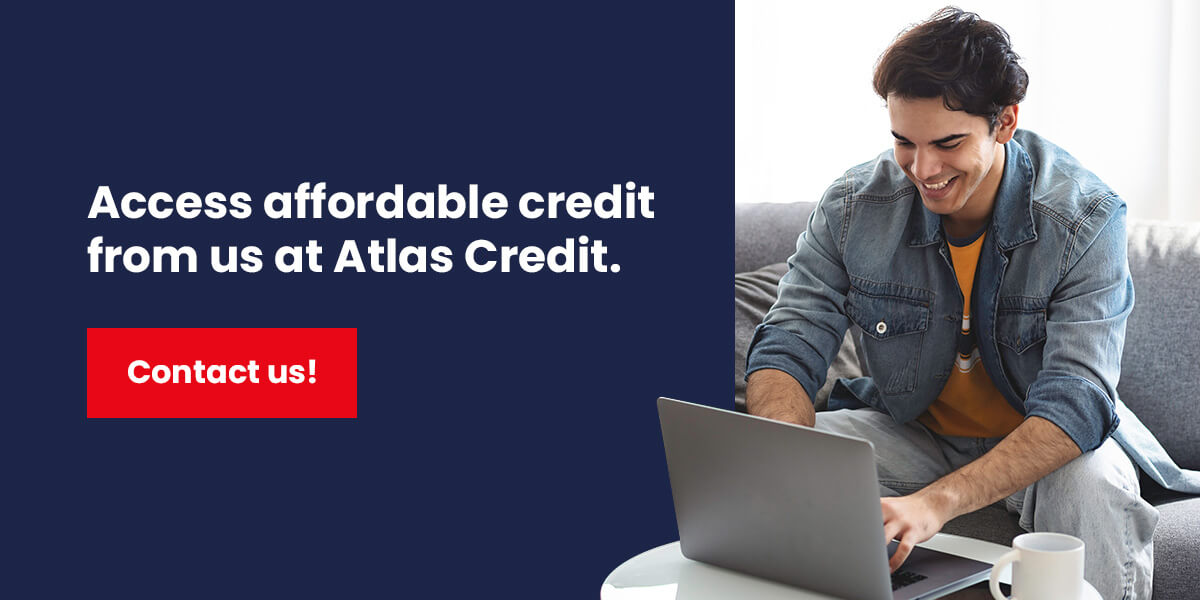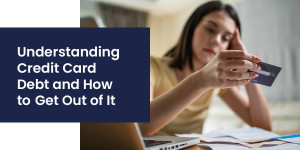
Credit cards have become a ubiquitous financial tool, offering convenience and flexibility. However, if you don't manage your use carefully, you may find your credit card debt out of control, leading to financial stress and long-term repercussions. This comprehensive guide explains how to get out of credit card debt without ruining your credit.
Table of Contents
- How Do People Get in Credit Card Debt?
- Does Credit Card Debt Affect Your Credit Score
- How to Pay off Credit Card Debt Quickly
- 1. Create a Budget
- 2. Pay More Than the Minimum Balance
- 3. Pay off the Most Expensive Debt First
- Debt Avalanche Method
- Debt Snowball Method
- 4. Stop Your Credit Card Spending
- Use Cash or Debit
- Grow an Emergency Fund
- 5. Make Extra Payments When You Can
- 6. Look Into Consolidating Your Debt
- Leverage Your Home Equity
- Take out a Personal Loan
- 7. Find a Payoff Method You Will Stick With
- 8. Enroll in Autopay
- 9. Reach Out to a Debt Management Consultant
- 10. Make On-Time Payments
- 11. The Nuclear Option: Bankruptcy
- Learn More About How to Get Rid of Credit Card Debt
How Do People Get in Credit Card Debt?
People can find themselves in credit card debt for various reasons. Here are some common factors that contribute to credit card debt:
- Overspending: One of the primary reasons people accumulate credit card debt is overspending. Using credit cards to make purchases beyond one's means or indulging in impulse buying can lead to a growing balance that becomes difficult to repay.
- Lack of budgeting and financial planning: Without a budget or proper financial planning, individuals may lose track of their expenses and fail to allocate sufficient funds for credit card bill payments. This lack of financial discipline can result in carrying a balance from month to month and accumulating interest charges.
- High interest rates: Credit cards frequently come with high interest rates, especially for those with poor credit or limited credit history. When individuals are unable to pay off their full balance each month, the accumulated interest can quickly escalate their debt.
- Emergencies and unexpected expenses: Unexpected medical bills, car repairs, or other emergencies can strain one's finances. If individuals do not have an emergency fund or sufficient savings to cover these expenses, they may turn to credit cards as a temporary solution, leading to increased debt.
- Minimum payment trap: Paying only the minimum amount due on credit card bills may seem manageable, but it can prolong the debt repayment process. Minimum payments primarily cover interest charges — only a small portion goes toward reducing the principal balance. This results in a cycle of revolving debt that becomes difficult to escape.
- Job loss or income reduction: A sudden loss of employment or a significant reduction in income can disrupt a person's ability to meet financial obligations. They may rely on credit cards to cover essential expenses during this period, leading to increased debt when there is limited income to repay it.
- Lack of financial literacy: Insufficient knowledge about credit cards, interest rates, fees, and responsible borrowing practices can contribute to credit card debt. Without understanding the potential consequences of carrying a balance or not managing credit effectively, individuals may find themselves trapped in debt.
- Peer pressure and lifestyle factors: Social pressure and the desire to maintain a certain lifestyle can lead to excessive spending on luxury items, dining out, or entertainment. Trying to keep up with peers or societal expectations without considering one's financial limitations can result in accumulating credit card debt.
Individual circumstances vary, and multiple factors can contribute to credit card debt. Developing healthy financial habits, budgeting effectively, and being mindful of spending can help individuals avoid excessive credit card debt and maintain a healthy financial position.
Does Credit Card Debt Affect Your Credit Score?
Yes, credit card debt can significantly impact your credit score. Your credit score is a numerical representation of your creditworthiness. Lenders and financial institutions use this number to assess your creditworthiness when you apply for credit.
Here's how credit card debt can affect your credit score:
- Credit utilization ratio: Credit utilization is the ratio of your credit card balances to your total available credit limit. High credit card balances relative to your credit limit can negatively impact your credit score. Maxing out your credit cards or carrying high balances can indicate a higher risk to lenders and lower your credit score.
- Payment history: Your payment history is a significant factor in calculating your credit score. Late payments or missed payments on credit card bills can have a detrimental impact on your credit score. It's crucial to pay at least the minimum payment by the due date to maintain a positive payment history. Consistently making late payments can lower your credit score and make it harder to obtain credit in the future.
- Length of credit history: The length of your credit history also plays a role in determining your credit score. Credit card accounts that have been open for a long time and have a positive payment history can improve your credit score. Closing older credit card accounts or opening new ones frequently can shorten your credit history and potentially lower your credit score.
- Credit mix: Having a diverse mix of credit accounts, such as credit cards, loans, and mortgages, can positively impact your credit score. Credit card debt alone may not significantly affect your credit score, but a healthy mix of different types of credit can demonstrate your ability to manage various financial obligations.
- New credit applications: Applying for multiple credit cards or loans within a short period can harm your credit score. Every application likely causes a hard inquiry on your credit report, which can lower your credit score temporarily. Additionally, opening multiple new credit card accounts simultaneously may raise concerns about your ability to manage more debt.
Responsible credit card use, such as paying your bills on time and keeping your balances low, can positively impact your credit score. Conversely, accumulating high levels of credit card debt and consistently making late payments can significantly lower your credit score. Maintaining a good credit score is essential for accessing favorable interest rates, obtaining loans, and demonstrating financial stability.
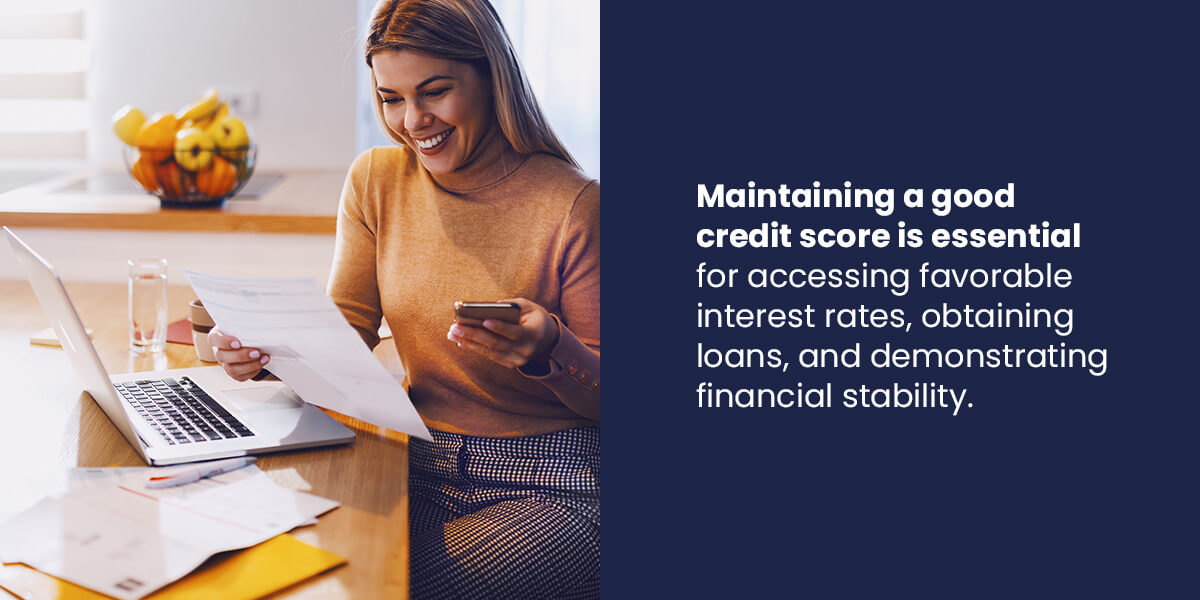
How to Pay off Credit Card Debt Quickly
Even if paying off credit card debt quickly feels daunting, know that it's possible when you take the right steps. With interest rates and inflation on the rise, your balance may continue to increase, meaning now is the time to pay off your balance. Using smart money tips, you can pay off your debt quickly and get your personal finances back on track. Follow these tips to pay off your credit card debt fast.
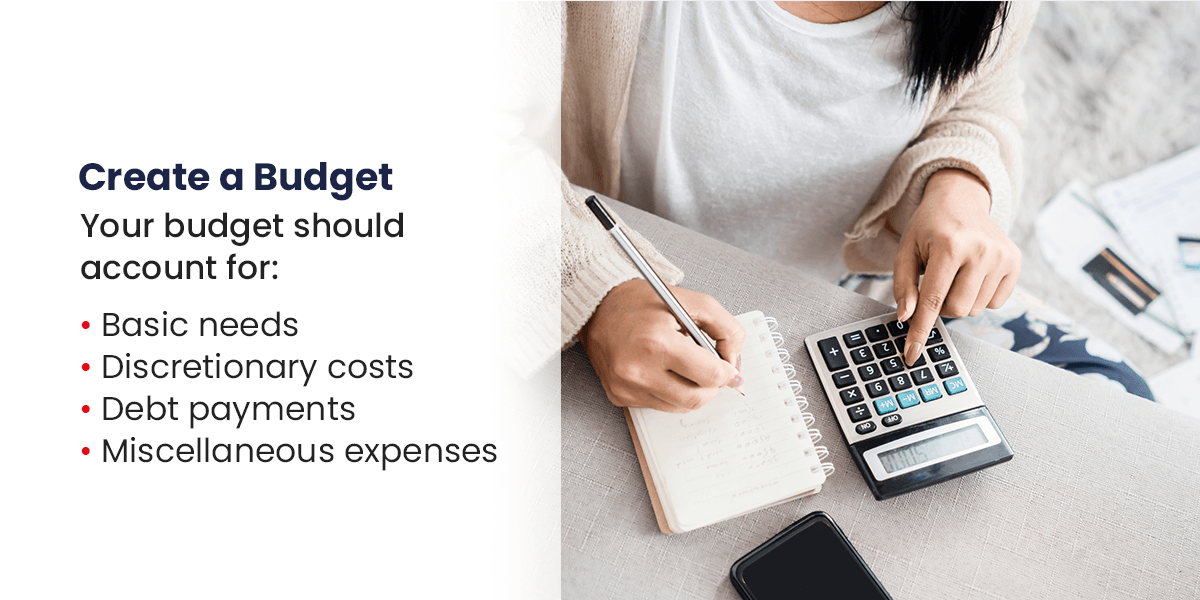
1. Create a Budget
Start budgeting to ensure you do not continue to overspend. Categorize your monthly expenses, such as food, housing, transportation, and entertainment. If you're unsure what you typically spend each month, review your bank account and credit card statement. Many credit card issuers categorize your spending, or you can categorize your expenses yourself. Your budget should account for:
- Basic needs: Your basic needs include costs like your mortgage or rent, groceries, gasoline, and utilities. Though you may be able to negotiate some of these bills or find ways to save at the grocery store, these bills are typically fixed from month to month.
- Discretionary costs: Your discretionary costs are for items you would like but don't need. Expenses in this category include entertainment, restaurants, and your daily coffee.
- Debt payments: This category includes your minimum monthly payment on credit cards, student loans, car loans, and other types of consumer debt.
- Miscellaneous expenses: You also have irregular expenses to cover, such as toiletries, car maintenance, travel, holiday gifts, and haircuts. These expenses are more difficult to predict and can quickly add up and become a source of credit card debt.
Understanding how you spend your money can help you identify areas where you can spend less and put more money toward debt repayment. By having a plan for how you will use your income each month, you can better plan for how you will get out of debt.
Some personal finance experts recommend following the 50-30-20 budgeting method, which means allocating 50% of your income to your needs, 30% to your wants, and 20% to savings, investments, and additional debt payments. While in debt repayment mode, you may want to increase the percentage of your income that you allocate toward debt payoff.
You can create your budget in a spreadsheet or use a free online budgeting tool that can sync with your bank account and streamline your personal finances.
2. Pay More Than the Minimum Balance
Paying off credit cards starts with making more than the minimum payment. By only making the minimum payment each month, it will take you longer to pay off your debt. On the other hand, paying more than the minimum means you will pay off your balance more quickly and spend less on total interest. Your credit card company must chart out this amount on your statement, so review your statement to determine how the interest affects your bill.
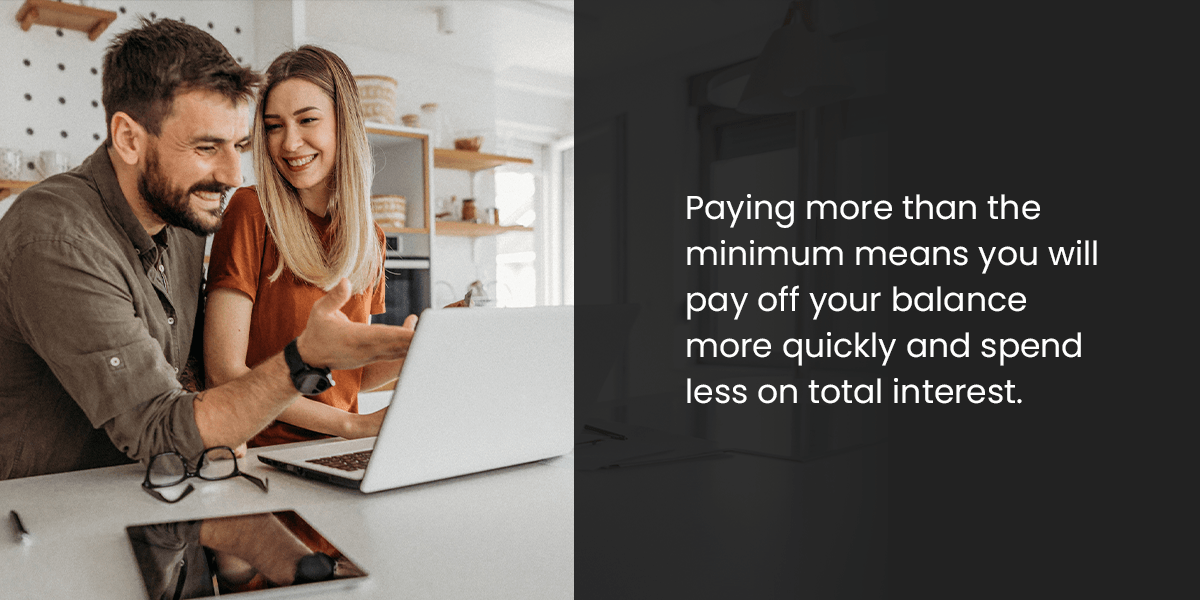
You can start with a small extra amount, such as an additional $20 a month you can spare. Any little bit helps to lower your balance, and the smaller your balance is, the less you'll need to pay in interest. If you aren't making enough money to cover all your expenses and pay more than the minimum balance on your credit cards, you may want to apply for a new job with better pay or pick up an additional part-time job.
3. Pay off the Most Expensive Debt First
Many personal finance experts consider paying the most expensive debt first as the best way to pay off credit card debt fast. This is known as the debt avalanche method. Other experts recommend the debt snowball method. We'll break down both below so you can decide which is the right method for you. Either way, after you meet the minimum monthly balance on all your credit cards, focus on paying more on one card at a time. Which card you choose depends on the method.
Debt Avalanche Method
The debt avalanche method means you will pay as much as you can over the minimum on the credit card with the highest interest rate first. If you want to use this method, figure out which card charges the highest interest rate and concentrate your efforts on paying down the balance on that card before you move on to the card with the next highest interest rate.
For example, if you have a credit card with a balance of $2,000 and an annual percentage rate (APR) of 24%, while your other credit card has a balance of $500 and an APR of 20%, using the debt avalanche method means you pay off the card with the $2,000 balance first. After you make the minimum payment each month, put your money toward this card until you pay it off. Then move on to paying off the balance on your other credit card.
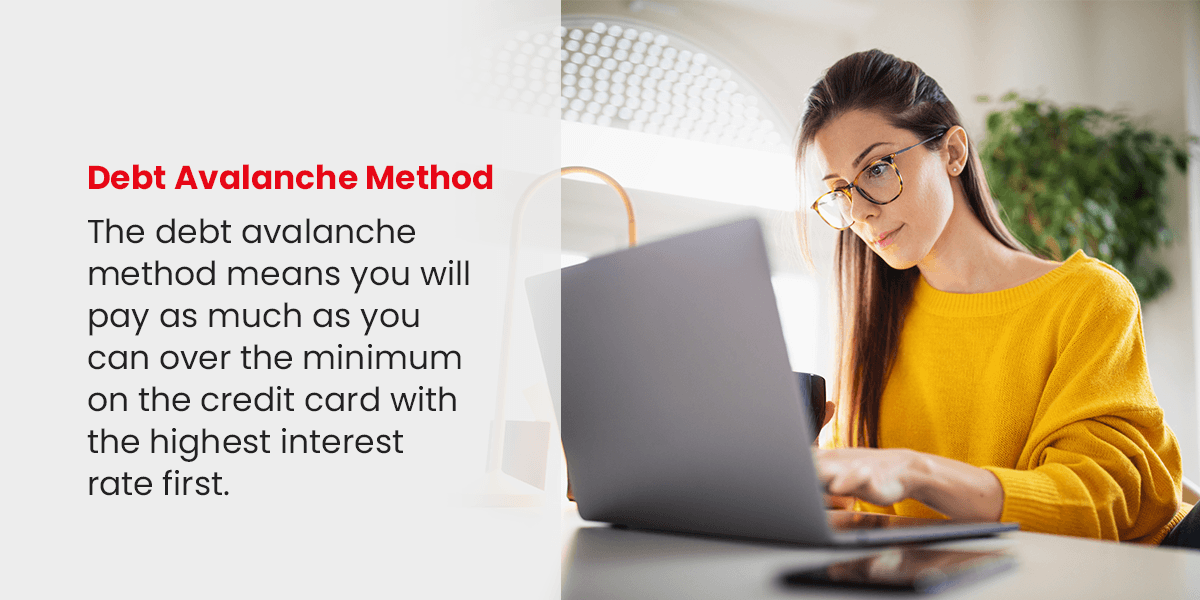
Debt Snowball Method
Another debt repayment method you can use is the debt snowball method. This method is essentially the opposite of the debt avalanche method. Instead of starting with your most expensive debt, you start with your smallest debt. You'll identify which card has the smallest balance and pay that off first. Then you'll use the money that you were putting toward that debt and apply it to the next smallest credit card balance.
Taking the above example, if you have a credit card with a balance of $2,000 and an APR of 24%, while your other credit card has a balance of $500 and an APR of 20%, using the debt snowball method means you pay off the card with the $500 balance first. This method will provide you with some momentum and improve your morale as you see progress faster.
We recommend trying the debt avalanche method, which will allow you to pay off your most expensive debt first. By paying off this balance, you free up your largest monthly payment, and you'll avoid paying more on that debt over time due to the high interest rate. If all you can afford is the debt snowball method, however, this is an effective debt repayment option too and may give you the quick confidence boost you need to continue paying off your debt.
4. Stop Your Credit Card Spending
If you still have a job and steady income, even the most mountainous debt can be manageable over time. Just because the number is staggering (and possibly growing day by day), you can still make payments toward it to lower it.
Your first step should probably be to remove your credit cards from your situation altogether. Cut them up if you have to so you won't use them anymore. You may not like it, but any extra money you add to your total debt can cause you even more problems down the road.
Next, you should cut out on your unnecessary expenses. Stop going out to eat, cancel your streaming services, drop entertainment out of your budget altogether, etc. By limiting your spending to the essentials only, you may actually start to improve your credit score thanks to the extra money you can put toward paying down your debt.
Use Cash or Debit
You can avoid accruing more debt by paying with cash or a debit card instead of a credit card. By leaving your credit cards at home, you can avoid making impulse purchases or overspending. Using cash involves the psychological act of physically handing over money, which can help you spend less. Paying with cash can also mean that certain purchases are so inconvenient, you're less likely to go through with the purchase.
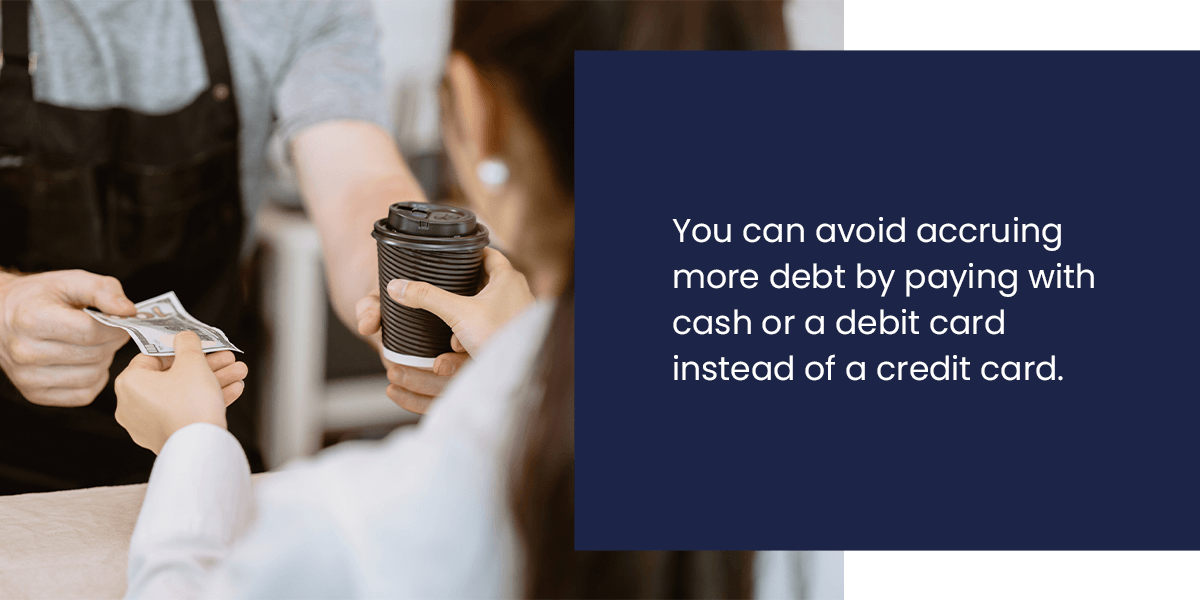
By using cash, you also avoid extra fees that may apply to a credit card. Additionally, using cash may make tracking how much you're spending each week or month easier since you can physically see the difference in the amount of cash you started and ended with that day, week, or month.
Grow an Emergency Fund
Some credit card holders rely on credit cards to cover emergency expenses, such as unexpected medical bills or car repairs. This can quickly lead to overspending and debt that is difficult to climb out of. We recommend saving an emergency fund instead of relying on credit cards to cover large, unexpected expenses.
If you don't have an emergency fund yet, now is the time to start saving one, even before you begin tackling your debt beyond your minimum required payments. An emergency fund will help you avoid acquiring more debt if an unexpected cost does arise.
5. Make Extra Payments When You Can
Paying off debt quickly can also involve making extra payments. Whether that means lowering your expenses, increasing your income, or making a payment with every paycheck, making more than one payment per month can lower your debt significantly over time.
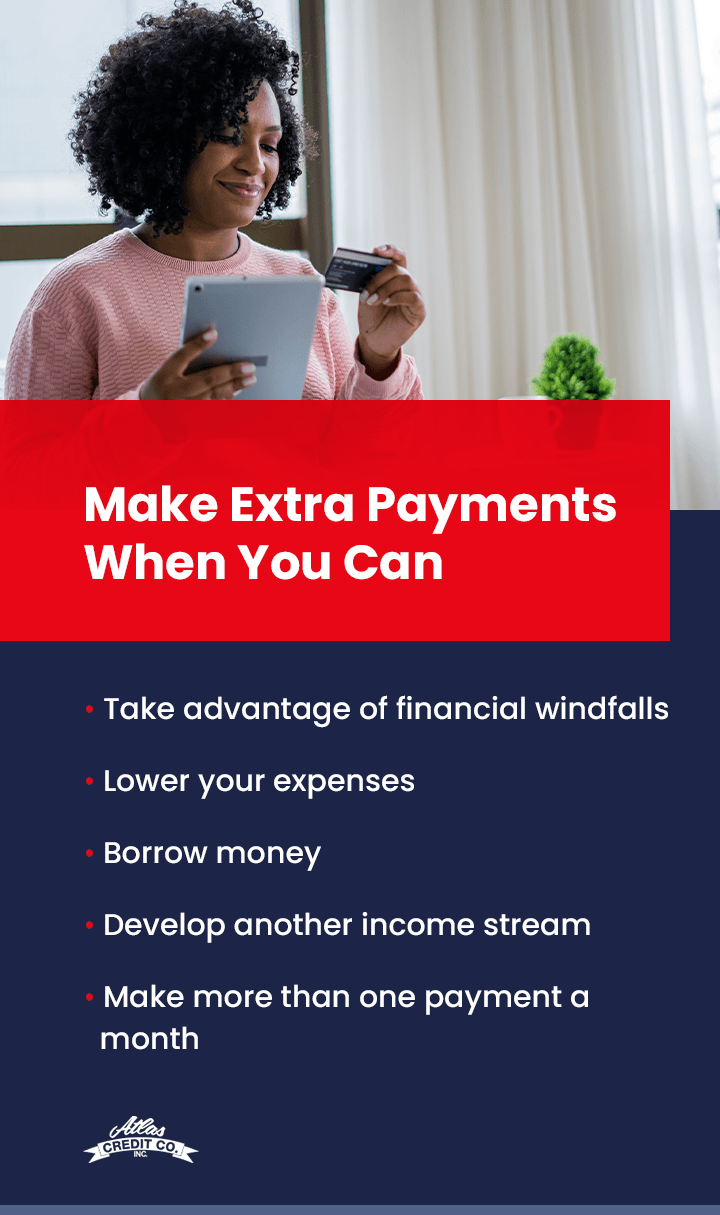
- Take advantage of financial windfalls: When you get a bonus at work, a third paycheck in the month, or money for your birthday or a holiday, put that extra income toward your credit card debt. This can help you achieve your debt repayment goal faster.
- Lower your expenses: Look for spending categories where you can lower your expenses. Cut back on discretionary spending, which is for things you can survive without, such as cable, streaming services, or your daily coffee. Look for monthly recurring payments you can cut out for the time being to increase your monthly positive cash flow. You may also be able to negotiate a lower rate for some of your monthly bills. When you've freed up more of your income each month, apply it to your credit card debt.
- Borrow money: If you're not lucky enough to have any financial windfalls and you've already cut your spending down as much as possible, you may want to ask trusted friends or family to borrow money. Set up a plan to repay the money you borrow and follow through on your plan to avoid damaging your relationship.
- Develop another income stream: If you have already reduced your expenses as much as possible and still don't have income left over each month to pay more than your minimum balance, you may want to consider starting a side hustle to make some extra money. From driving for a ridesharing company or bartending to mowing lawns, delivering pizza, or babysitting in the evenings, you have nearly endless options. You can then apply this extra income directly to your debt.
- Make more than one payment a month: Instead of only paying your credit card down when the payment is due, you can pay money from each bi-weekly paycheck or as frequently as possible to reduce debt faster.
These extra payments can go a long way in helping you pay off your credit card debt more quickly. Once you've paid off your debt, you can use any extra income to grow your savings.
6. Look Into Consolidating Your Debt
When you consolidate your debt, you can combine multiple high-interest balances and get a lower rate on the total balance with a single fixed, monthly payment. This allows you to pay down your debt more quickly without increasing payment amounts. You can consolidate your debt by making a balance transfer or leveraging your home equity. After consolidating your debt, you will only have one area to pay into, which can be easier to keep track of than multiple different cards.

Make a Balance Transfer
Look for a low balance transfer rate and take advantage of this rate to move your debt from high-interest credit cards. You may also be able to find zero-interest balance transfers, allowing you to transfer your balance to a balance transfer credit card with zero interest for a certain amount of time, usually around one year.
Keep in mind that balance transfers often come with a fee, but even with a fee, the lower interest rate may mean you save more money in the long run. Be sure to factor in the fee when calculating whether this is the right option for you. You may also be limited in how much you can transfer, and you can't perform a balance transfer between cards from the same issuer. Before you request a balance transfer, read the fine print.
Your credit score may also affect whether you qualify for a balance transfer credit card. Good or excellent credit is still possible with credit card debt if you maintain a low credit utilization rate and make on-time minimum monthly payments. If you have good or excellent credit, you may even qualify for a zero-interest APR balance transfer. A zero-interest introductory offer can make paying off your high-interest debt faster and easier. Keep the introductory offer term in mind and try to pay off your debt while the zero-interest offer lasts.
Leverage Your Home Equity
Do you own your home? If so, you may be able to take out a home equity loan to pay off your credit cards. Home equity loans allow you to borrow against the value of your house by pulling out some of the equity you have built up. Often the interest rates for a home equity loan are lower than your credit card rate.
Getting rid of credit card debt becomes easy. You can wipe out all of your debt by drawing as much as you need from your home equity loan. Just make sure you make on-time monthly payments on your loan going forward. You want to strengthen your credit score, and falling behind or defaulting on payments will make your credit score worse.
Take out a Personal Loan
Another way you may be able to consolidate your debt is by taking out a personal loan. This type of loan is a shorter-term consumer loan that can help you meet your specific financial needs. Personal loans tend to be flexible, allowing you to select the amount you want to borrow.
If you have a large amount of credit card debt that you won't be able to consolidate with a balance transfer, you can choose a personal loan for consolidation instead. If you have a qualifying credit score, you may be able to obtain a personal loan amount that covers your entire balance across multiple credit cards.
Typically, you'll get a personal loan with a set amount over a certain period with a fixed interest rate. Personal loans often come with lower interest rates than credit cards. With Atlas Credit, you may qualify for a personal loan whether you have good, bad, or no credit.
No matter which consolidation method you select, if you choose to consolidate your debt, try to keep your spending under control and avoid taking on new debt, which could undo the advantages of consolidating to a lower interest rate.
Apply For a Personal Loan Online
7. Find a Payoff Method You Will Stick With
No matter which payoff method you choose, make sure it's one you can stay with. Find a healthy amount to pay each month that you can comfortably afford and stick to it until your debt is paid off. Include the debt as a monthly expense in your budget.
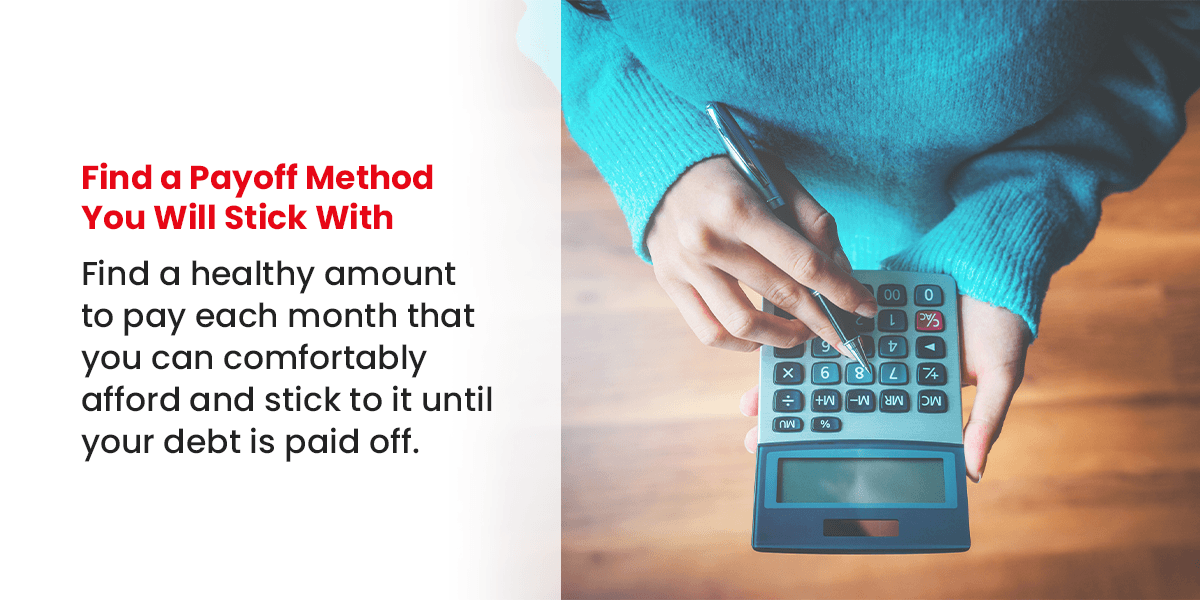
As mentioned above, pay more than your minimum payment each month and follow the debt avalanche or debt snowball method. Both methods have advantages, so be realistic with yourself when determining which way you'll be able to stick to. Will you be willing to wait to pay off your most expensive debt first, or do you need to see progress as soon as possible to stay motivated? Ultimately, whatever the amount or method, make certain it is reasonable and you can stick to it.
8. Enroll in Autopay
Never miss a payment by enrolling in autopay. Automating debt payments can ensure you're paying your bills each month without having to remember each due date, especially if you have multiple credit cards.
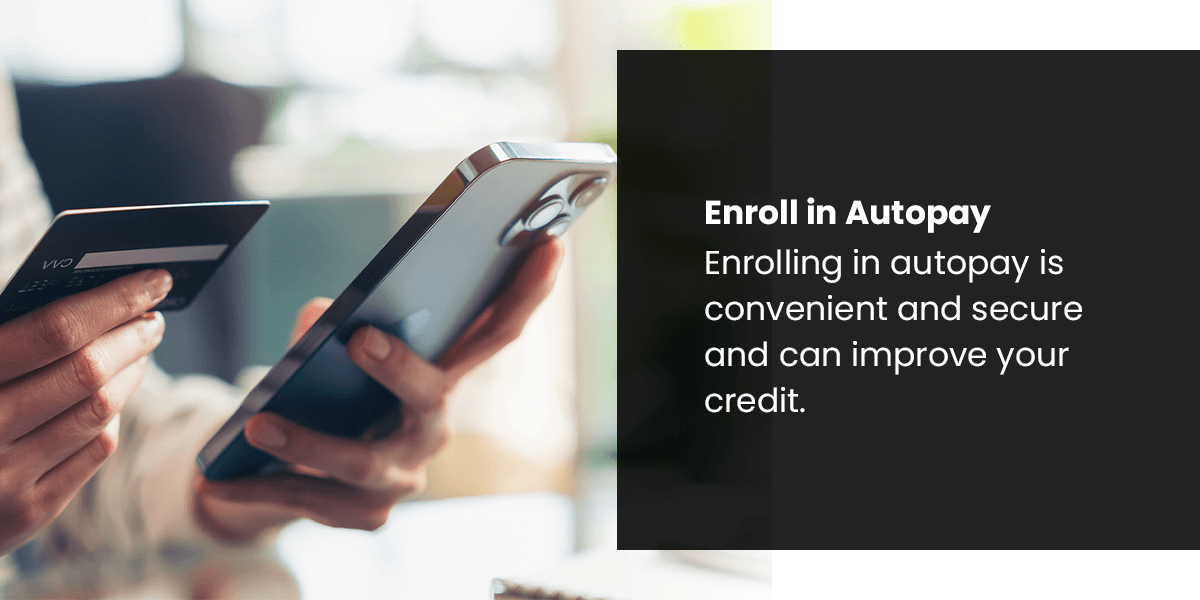
Enrolling in autopay is convenient and secure and can improve your credit. Rather than needing to visit several websites or apps each month to make your payments, you can rest assured that the payment will automatically come out of your bank account each month without you needing to make a payment manually. Setting up automatic payments means you can also avoid late fees and boost your credit score by making regular, on-time payments.
To enroll in autopay, sign up directly through your credit card issuer. This ensures the issuer takes the full amount you owe each month. You can also opt to set up electronic alerts so you'll be notified via text or email about when your bill is due.
9. Reach Out to a Debt Management Consultant
Some people may reach a point in their financial woes where they recognize it could be impossible to actually pay their existing debt as is. That's when a debt management plan comes in.
First, find a credit counseling agency in your area that specializes in credit card debt reduction. By working with your credit card issuer, it's possible for your counselor to secure a lower interest rate and possibly smaller payments each month. That way, if you continue to pay the same amount as before, your credit will slowly improve thanks to your strengthened efforts to pay down your debt.
However, debt management consultants often cost you both time and a small fee each month. Be certain ahead of time that their services are absolutely necessary and that they will help you reach your goal of becoming debt free.
10. Make On-Time Payments
One way to get out of debt with bad credit is to make sure you pay at least the monthly minimum on your bills on time. Making late payments hurts your credit score. It makes lenders think you are a poor risk because you can't pay money back on time. When you pay even a day late, it hurts your credit score.
Create a monthly reminder on your calendar to pay your credit card bill. As soon as you see that reminder, make your payment. Set the reminder a week before your payment is due, so that if you run into any issues with payment, such as a banking app being down or slow online transactions, it won't make you late.
11. The Nuclear Option: Bankruptcy
Nobody likes the word bankruptcy. But sometimes, it may be your only way out of debt.
Bankruptcy can severely harm your credit score for up to a decade. Plus, you'll have to take the issue to court and will owe attorney fees. Also, some debts cannot be erased, like child support payments, student loans, and some others.
Once you have declared bankruptcy, though, you are granted something of a clean slate. Your credit card debt is no longer a major burden, and you can work to rebuild your credit score over time. After your bankruptcy is removed from your credit history, your fresh start can truly begin, and the wisdom you gained along the way can help you reach true financial success in your future.
Learn More About How to Get Rid of Credit Card Debt
Escaping the grip of credit card debt requires knowledge, discipline, and strategic planning. By understanding the nuances of credit card debt, creating a repayment plan, and seeking professional guidance when necessary, you can take control of your finances and pave the way to a debt-free future.
Achieving financial freedom may take time and perseverance, but the rewards of improved financial well-being and peace of mind are well worth the effort. Access affordable credit from us at Atlas Credit, or contact us to learn more about how to pay off credit card debt.

